My quest to play Voidfall 14 times was made possible by one thing, and one thing only: the inclusion of a robust solo mode.
Here’s the funny thing: I think Voidfall is almost always a solo experience. Either you are playing it by yourself, or you are “playing” it with a couple others at the same table. In the latter case, you are mostly going to operate on your own.
Voidfall is certainly the best “heavy” game I have ever tried solo, but I’m not sure how large a pool of games that is. While I didn’t buy this only for the solo mode, I could see why others in my network did just that, particularly because of the design of Nigel Buckle and David Turczi’s previous collaboration series, Imperium: Legends and Imperium: Classics.
While I have only played Imperium: Classics multiplayer, I’ve read, watched and heard from many of my media peers that Imperium’s structure might be better as a solo game. I believe it, and now that I have seen the care that was implemented in the Voidfall design across player counts, I think Voidfall shines as a one- or two-player game.
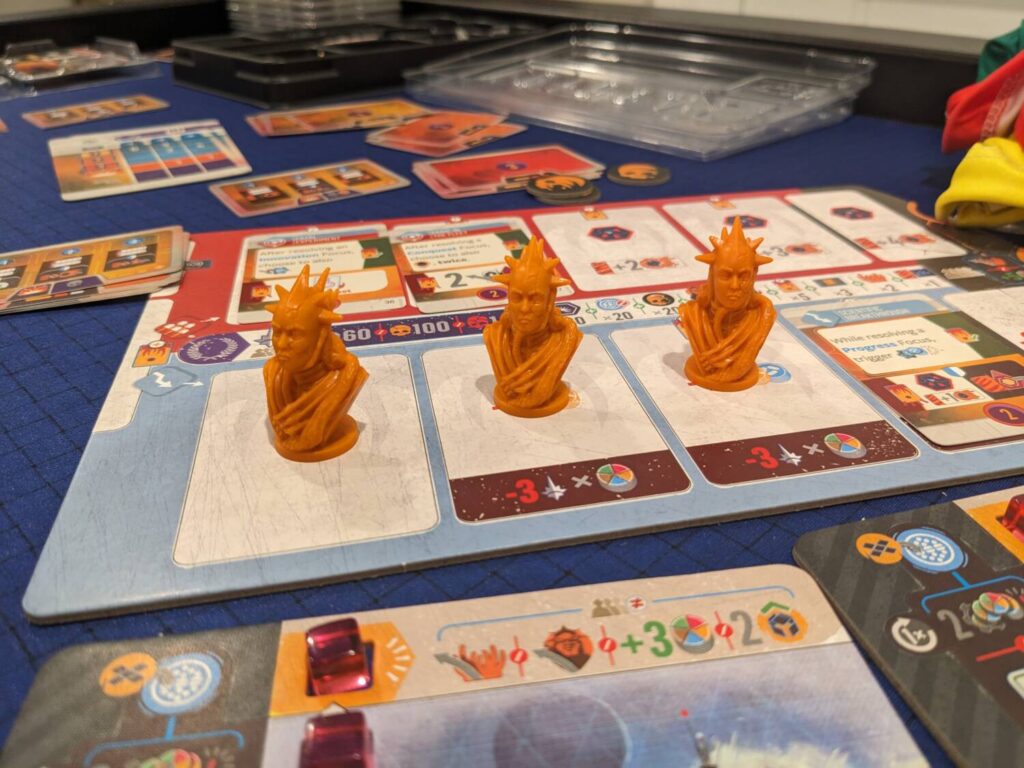
Solo: Eight for Eight (Plays, Not Wins)
Of my 14 Voidfall plays, eight were solo, thanks to the eight solo map setups in the Compendium. In both the solo and co-op modes, a series of extra stuff needs to be included: a Crisis Board, Alert cards, Crisis cards, Safe Haven tiles, a Focus card deck meant to only be used in the Solo and co-op formats, and Harbinger tokens.
All of this extra stuff, on top of what was already the most component-rich game in my collection, means that co-op and solo in Voidfall constitutes rarified air—these two modes are harder and longer than the base game. That’s pretty incredible, because Voidfall is already the hardest/longest/most complex game I’ve tried in 2023.
Setup is already a bear with Voidfall. Solo doesn’t really add that much time to the proceedings. Thankfully, once you are set to go, the beauty of Voidfall’s design shines through the noise no matter the play format. You have a hand of Focus cards, tough choices, and Voidborn that need to be exterminated. In the solo and co-op formats, your goal is to outscore the AI using a base score established by the difficulty level (60 for Easy, 100 for Medium, 140 for Hard) and that AI score is then boosted by a host of other factors. In my experience, you usually have to score more than 100 points to win on Easy, 150-200 points on Medium, and who knows how many points on Hard.
I’ll never know the answer to this last question, because I never want to try Voidfall’s solo/co-op modes at that difficulty level. That is due to a host of factors which we’ll cover below.
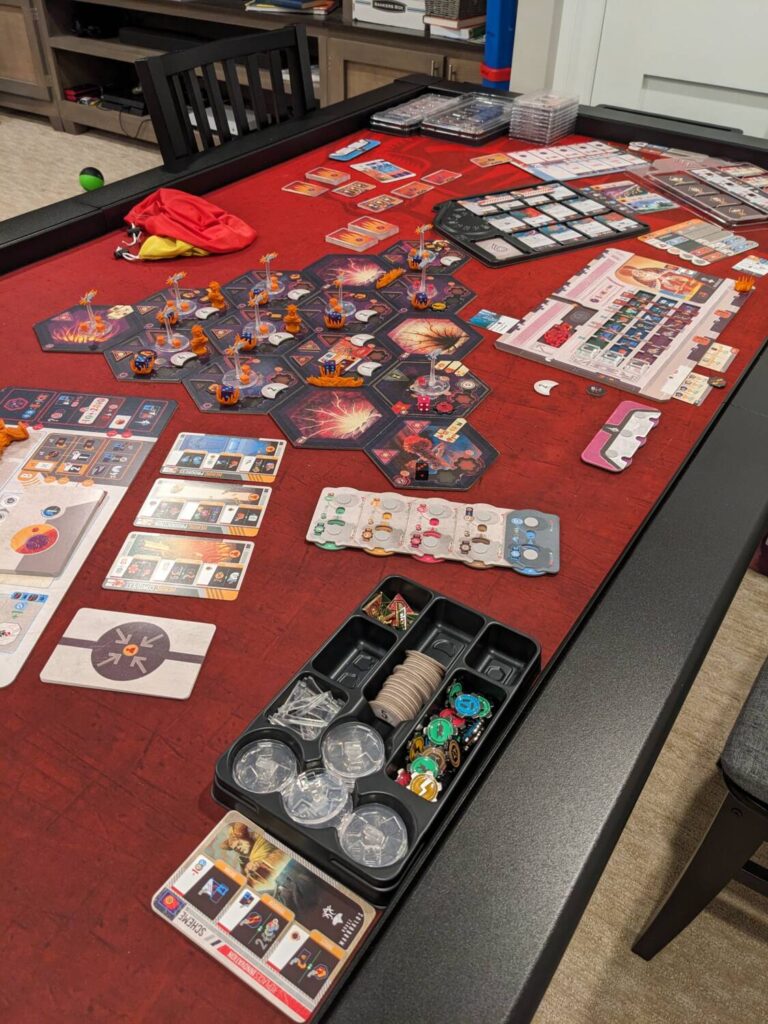
The main gameplay change outside of competitive mode is the Crisis Board. To make an already-difficult game harder, there are unique events (Crisis cards) that must be overcome on every single turn, not just at the start of the Cycle (or round). Yes, that means you might be faced with as many as 16 different mini-events, along with the three Galactic Events, in each game using the solo/co-op ruleset.
On Easy, I didn’t mind this as much, because some of these Crises are situationally easier to achieve. Often, these come in the form of slightly elevated costs: “On this turn, when completing XXXX action, spend one extra resource.” OK, so the cost is just randomly higher on this turn. I don’t love it, but it does push players to plan a little better than they might in the competitive mode.
Most of the mini events faced in Easy mode are not bad. If you don’t complete them by the end of your turn, the Crisis card is added to the Crisis Board, which ups the price at the end of each Cycle by forcing players to spend resources (or lose Influence, or victory points) and have a more difficult Skirmish at the end of the Cycle.
Where things get interesting—or “interesting”, quotes intentional, depending on your point of view—is when Solo is played on Medium or Hard mode. That’s because the Crisis cards quickly move from “not bad” to “utterly ridiculous” as players are forced to use not only the Level I and Level II Crisis cards, but the Level III Crisis cards too. The Level III Crisis cards feel like Buckle and Turczi were out drinking one night and thought up some of the worst ways they could punish players and still keep the Voidfall gameplay loop intact.
Let’s set the stage. Here are some examples from the Level II Crisis deck:
- Stronghold of Humanity: Increase Population while already having a Pure sector with 5+ Population.
- Penalty: Gain a Corruption on a sector.
- Analysis: Not bad. Not ideal, and this is hard to do early in the game because usually it takes a few turns to boost Population up to 5 or higher. But this penalty feels reasonable.
- Forward Planning: Gain an Agenda (scoring card) while already having one or more Agendas in your hand.
- Penalty: Destroy two Sector Defenses in a non-Home sector (same or different).
- Analysis: This penalty is brutal, especially if you are holding a sector with, say, one Fleet Power, and the current Voidborn Fleet Power is high. I like this card, though—it is exactly what it says it is, by planning forward a few turns ahead and intentionally NOT playing your Agenda cards when you want to badly do just that. Feels right.
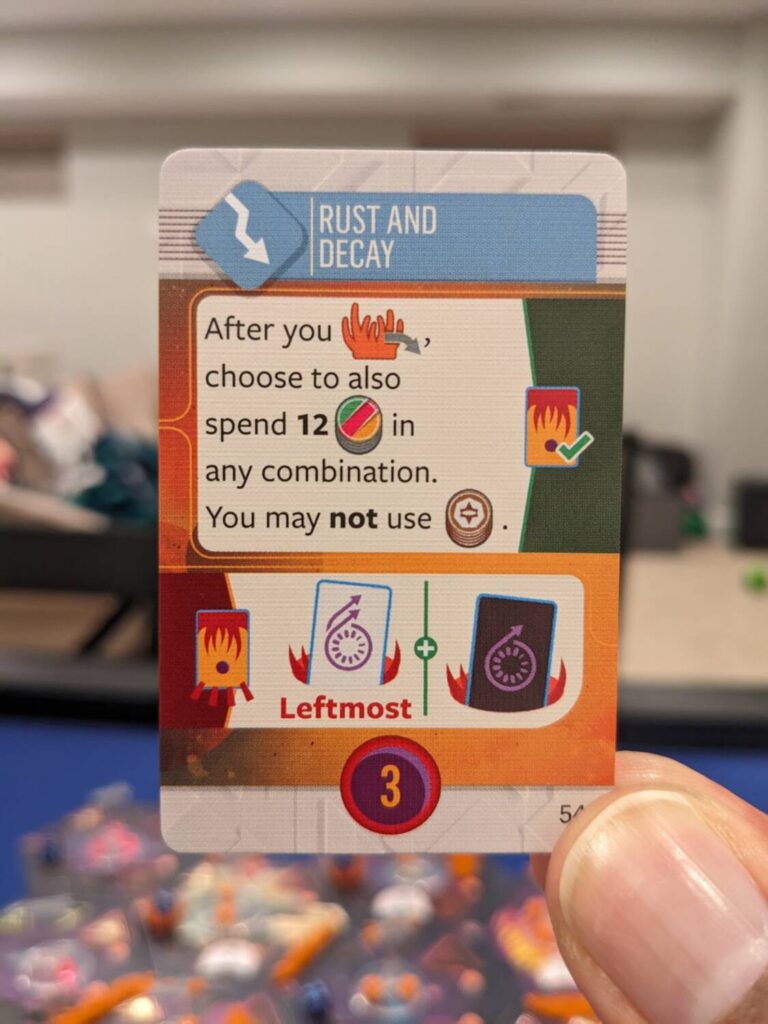
So, there are plenty of unique challenges that show up even on Easy mode. Great. Here are some of the cards from the Level III Crisis deck, which can appear in Medium and Hard modes:
- Hidden Novarchon Riches: Before you produce Credits, choose to destroy a Bankers’ Guild in a non-Home sector.
- Penalty: Skirmish with one more Voidborn Fleet Power than normal. If successfully defended, place a Sector Defense on a Voidborn sector adjacent to the Combat sector, if able, otherwise place it on any Voidborn sector.
- Analysis: a common thread among the “if successful” moments of Voidfall is that you earn the right to get punched in the face again. In many ways, Voidfall is the Dark Souls of board games, a reference that I know resonates with the Mindclash team because many of them are video game fanatics. Even successfully taking on this card is tough. A player with Bankers’ Guilds is usually leaning into that for Agenda scoring to begin with, so to choose to destroy one is painful. To do it BEFORE producing Credits, which already produce at a lower rate than the other resources, is a gut punch.
- Rust and Decay: After you gain a Corruption, choose to spend a total of 12 Food, Energy or Materials in any combination. Credits cannot be used as substitutes.
- Penalty: Consume the leftmost Improved Technology from the Galactic board and a Basic Technology from the tableau.
- Analysis: of the 68 Crisis cards, I believe this is the most brutal of them all. In my 14 plays, I have not seen an instance where I had 12 EXTRA resources just lying around. Also, players are actively pushing to not take on Corruption, especially late in the game, because that impacts the ability to score Agenda cards. And this penalty? Rough, but strangely enough, this is not a gamebreaker. There have been games where I would happily dump an Improved Technology that I couldn’t use anyway and a Basic Tech that doesn’t align with that game’s strategy. But that just means the Crisis card is going to sit on the Crisis Board taking up space, which is terrible when it comes to the requirements of spending resources.
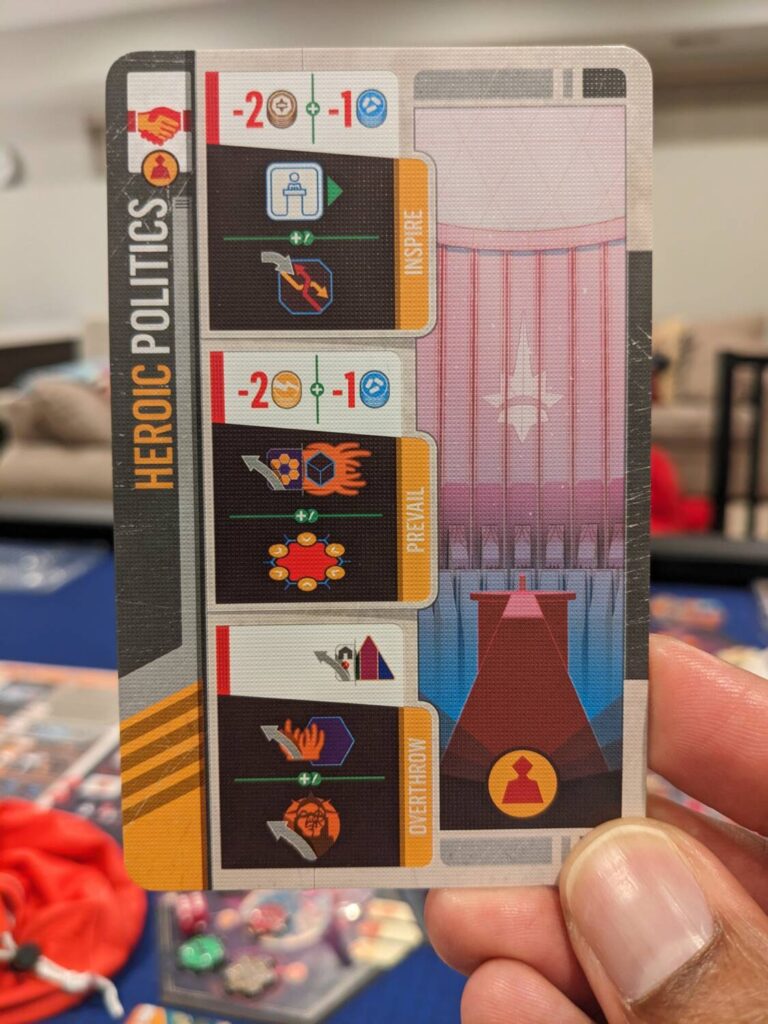
The Crisis cards are tough. The game’s mitigation strategy for these cards: improved Focus cards that can be used from a tableau added only for solo and co-op games, known as Joint (co-op) and Heroic (solo) Focus cards.
These new Focus cards feature most of the same actions that appear on the game’s nine base Focus cards, but they are supercharged to do a lot more than the cards in a player’s hand. By discarding a card with the same title, a player can use the Joint/Heroic version of a card to do some dope stuff if they have the resources to pay for them.
I love these additional Focus cards, because as I have noted in other “Into the Voidfall” articles, I love staring deeply into the eyes of those Focus cards. What really makes them great comes to light during the co-op version of the game…which is my favorite way to play Voidfall.
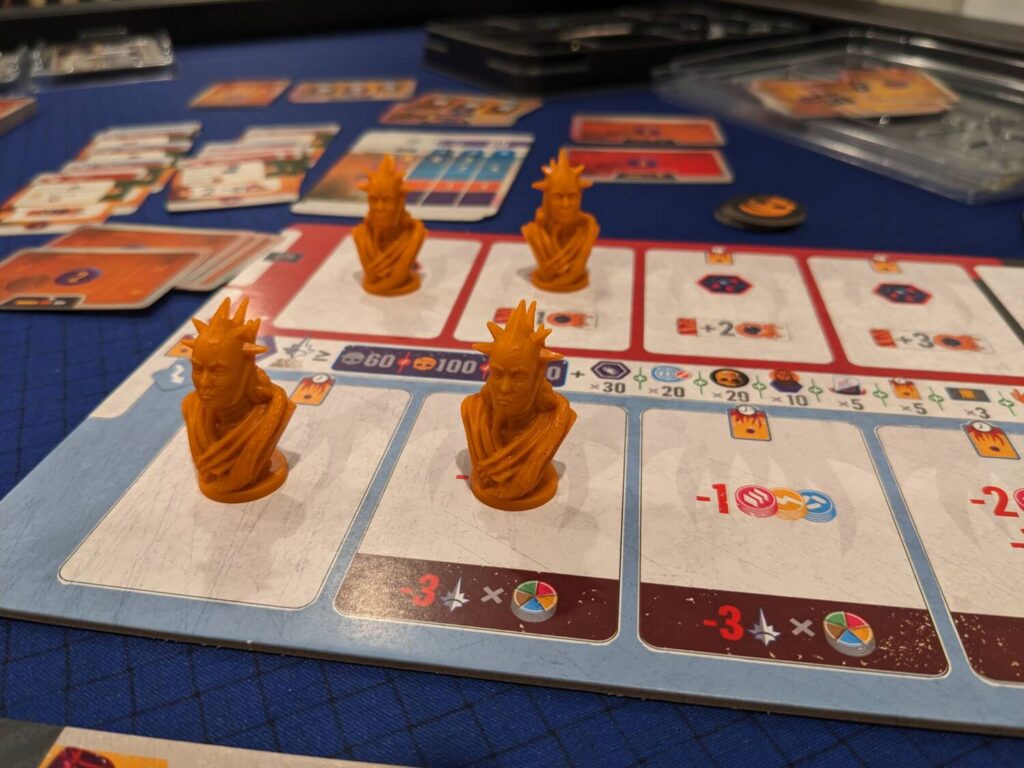
Use Your Words!
Although I enjoyed all my Voidfall plays, my favorites came during the Medium difficulty games Alec and I played on the Devil’s Triangle and When Darkness Fades maps. That’s because we played those on co-op mode, and it was fun working through the puzzle while talking to each other.
No grunts from one person to the next. Lots of words were used across the table, particularly when we needed to use one of the Joint Focus cards. Plenty of chatter as we debated which Crisis cards should be added to the Crisis Board, versus which ones should be forfeited to take as penalties instead.
The shared experience of a tough game like this is made interesting because there are so many ways to skin a cat, and because the design is composed of such a magnificent puzzle. Here’s the other thing about co-op: all players need to beat the Voidborn’s score, not just one player. So, in some cases, you will need to drag one player across the finish line, or ensure that enough is done against the Voidborn to ensure the player with the lower score is still higher than the Voidborn.
That last point was such a fun strategy to pursue. You can tell how much the Voidborn are going to score as games are wrapping up. Sometimes, we found that aggressively taking out Voidborn strongholds or purifying sectors was a path to victory, so splitting those tasks up across the vast map of the galaxy made it easier to outscore the Voidborn. In other cases, a strong economic engine might be enough to outscore the AI as long as you can really push on scores north of 250+.
In co-op, each player draws a Crisis card to start their individual turn. So, in a two-player game, we found that the Crisis Board filled up fast. But that just meant we had more chances to address the various challenges of the Crisis deck together, while talking out timing considerations of when it made sense to do that.
Co-op—for me—was great. Alec is not as big a fan of cooperative games in general (although, by his own admission, co-op games with his wife is the preferred route at home), but he said that he was coming around to the idea of working together by the end of our second play. Alec definitely prefers competitive over co-op, but because the core gameplay loop is the same in both co-op and competitive, a Voidfall fan will likely be happy playing any version of the game.
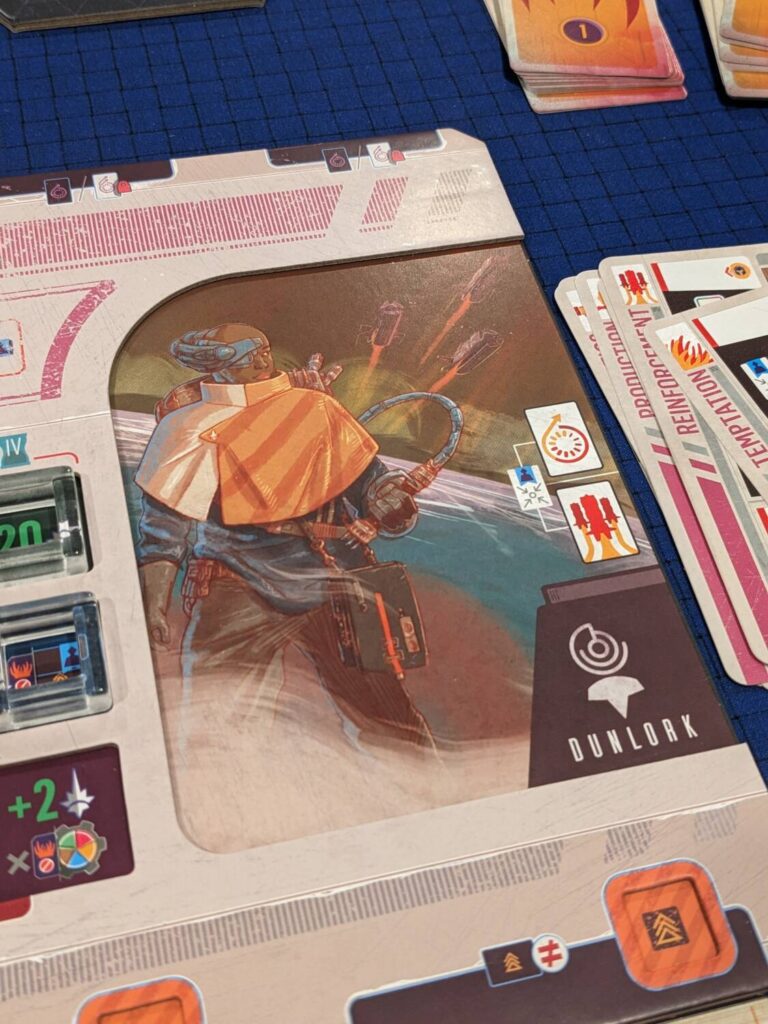
Co-Op for the Win (Together)
The core mechanics behind Voidfall make me happy regardless of the play mode. But if I pull the game off the shelf, I will only be doing it to play co-op or competitive game modes in the future.
The solo mode is still strong. It’s just not the reason I would recommend dropping $200 on the deluxe version of Voidfall. Solo players will have a different opinion, and I welcome that. But the way these random challenges play out (particularly on Medium) made me less inclined to pull the game off the shelf to spend a few hours staring at the puzzle.
Co-op, though? Heck yeah.
I get all the Voidfall that Voidfall has to offer. With one, maybe two other players (I might be willing to go “3P” on this), I get a big map to tackle with others while working out the best ways to solve the riddle of scoring 200+ points. You can still get a slightly competitive edge to the experience—the player that beat the AI the best “wins”, even if we technically all win the game as long as all of us outscore the Voidborn/AI faction.
Sure.
The main thing I like about co-op over the other Voidfall game modes is the interaction. Voidfall is a big, tough piece of chicken, a fascinating design that has one of my favorite core mechanics of the year. But it’s lonely in space when everyone is staring at the cards and NOT talking…co-op mode breaks that cycle.
Whew. I’ve written a lot of words about Voidfall. How about we wrap this up with a review?


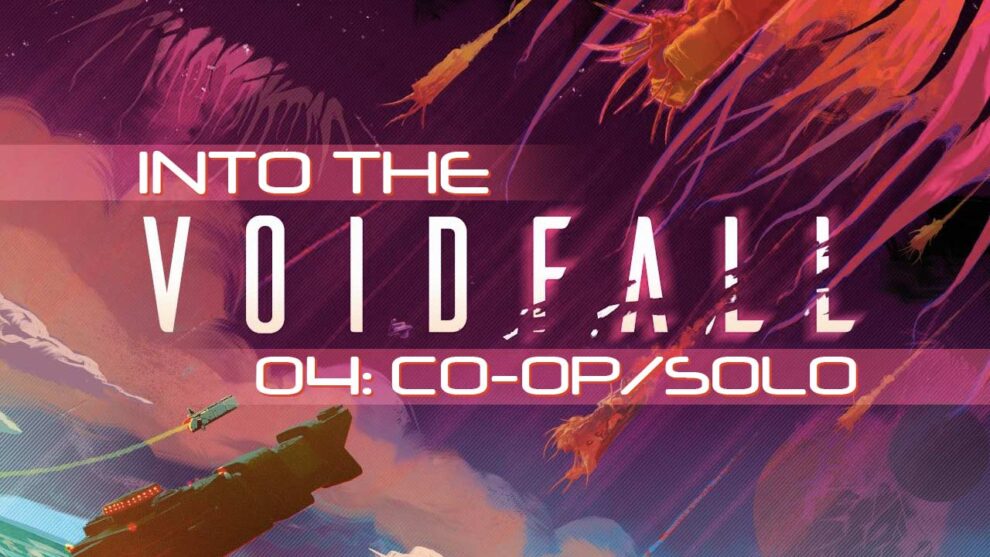


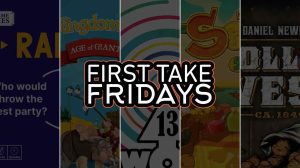
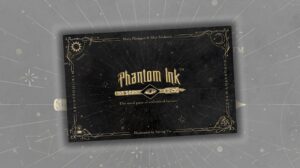





Excellent! You nailed the landing! The entire series was just perfect.
Thanks for a wonderful read throughout.